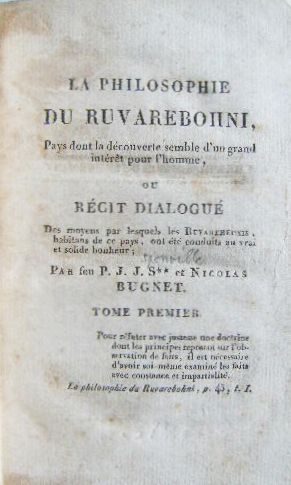'It is the principle here that it is not essential that the people are in
large numbers, but that it is of capital importance that they are happy‘
First edition. Very rare since most copies were seized and destroyed by the police, with only two copies located in WorldCat. The most famous utopia of the Napoleontic era. It is however not only an imaginary voyage but also a political attack against France (‘Narcef'), the French (‘Inarçafs') and Napoleon (‘Ponelano'). It is written in the form of a dialogue between an inhabitant of an unidentified country named Ruvarebohni (an anagram of ‘Vrai bonheur') and a foreign visitor. It contains numerous ideas that foreshadowed those of the utopian socialists of the following decades. The second work, Bugnet's Catéchisme, occupies the second half of the second volume and has an own title-page and pagination. The publisher's name appears only on the verso of the title of the first work. The second work has the publisher's name on title, it had been published separately already in 1808. The next year Bugnet finished the whole work after the manuscripts left by his close friend Jaunez-Sponville. A new edition appeared 1881 edited by Carle de Rash (pseud. for Charles Read) ‘d'après un exemplaire échappé au pilon de la Haute Police Impériale'. The absence of the two leaves (p.7-10) from the second work is correct and explained in the errata. *INED 2353. Maitron II,p.375. WorldCat locates copies in the BnF and BL only. |

